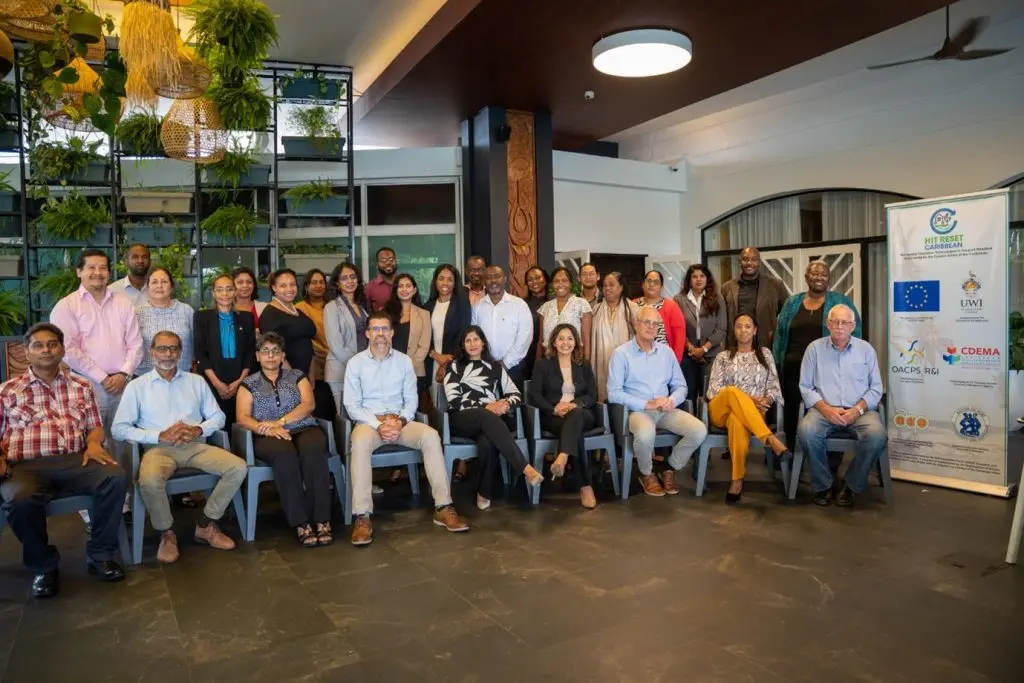On May 29th, the city of Paramaribo, Suriname, played host to a significant event: the first major gathering of representatives from the nine beneficiary projects of “Harnessing Innovative Technologies to Support Resilient Settlements on the Coastal Zones of the Caribbean” (HIT RESET Caribbean).
This program, implemented by the University of the West Indies (UWI), the Anton de Kom University of Suriname (AdeKUS), and the Caribbean Disaster and Emergency Management Agency, is funded by the ACP Innovation Fund and the OACPS Research and Innovation Program, and executed by the Organization of African, Caribbean, and Pacific States, with financial support from the European Union.
The event brought together leaders and prominent figures in the field, facilitating various logical framework review sessions. During these sessions, teams had the opportunity to meet and engage with distinguished individuals, including Gerard den Ouden from the Technical Assistance Unit, Lennise Baptise, an M&E consultant, and other members of the UWI staff, such as Cheryle Dubay Tewarie, Manager of Research and Business Development Financing, Mary Balbirsingh, Financial Manager, Bursar, Dr. Graham King, Director of STACIE, and Dr. Perry Polar, Program Director.
During the gathering, participants shared their experiences and knowledge regarding the challenges and opportunities facing organizations in the Caribbean. Each project had the opportunity to introduce itself, with the Dominican Republic officially presenting the project: “AdaptCC: Using digital information technologies for climate change adaptation and increased resilience in urban and coastal areas of the Dominican Republic” presented by Dr. Orisell Medina Lagrange, Dr. Virginia Flores, and Dr. Victor Bohorquez.
The other projects presented were equally impressive:
- “Using data and tools to map and monitor informal coastal settlements (MINDSET)” – presented by Dr. Carol Archer and Mr. Michel Frojmovic from the University of Technology – Jamaica (UTECH).
- “Integrating digital technologies and participatory tools to support the resilience of coastal communities in Trinidad and Tobago (Tech4CoastalResilience)” – presented by Ms. Ainka Granderson from the Caribbean Natural Resources Institute (CANARI).
- “Advancing Safety and Sustainable Transportation (ASSET)” – presented by Dr. Samantha Chadee from the University of Trinidad and Tobago (UTT).
- “Comprehensive coastal risk vulnerability data web platform for Dominica (CHVP – Dominica)” – presented by Ms. Gabrielle Abraham from Smith Warner International.
- “Smart and climate-resilient settlement in Bluefields (BSCRS)” – presented by Mr. Hopeton Ferguson from Spatial Innovision.
- “Developing a sargassum biomass prediction application (SBPA) and the resulting pilot biogas production (SarGASsum)” – presented by Dr. Legena Henry and Dr. Erwin Edwards from Atom Solutions Inc.
- “Innovative early detection pest and disease management system using the IoTree® sensor for real- time digital monitoring of the South American palm weevil to conserve coastal coconut palms in select CARIFORUM countries (Conservation of coastal coconut palms)” – presented by Dr. Annika Minott from the Caribbean Agricultural Research and Development Institute (CARDI).
- “Building Resilient Communities (BRC)” – presented by Ms. Jennifer Massiah, representing Habitat for Humanity (HFH).
During workshop sessions, participants had the opportunity to examine synergies among the projects. Information was tabulated and represented through a connection circle. The AdaptCCDR team showed particular interest in the projects from Jamaica, the Caribbean Natural Resources Institute, and Habitat for Humanity, identifying similarities, situations, and solutions that could be highly beneficial for the national project.
The gathering gave the AdaptCCDR team a valuable opportunity to share practices and strategies with their peers. They considered the workshop as a conducive space to exchange ideas among different projects and, vice versa, learn from various approaches and methodologies used in innovation projects.
In conclusion, the meeting was a resounding success. Participants expressed their gratitude for the opportunity to share their ideas and learn from others’ experiences. They emphasized the importance of collaboration as a fundamental element in addressing the challenges facing the Caribbean.
HIT RESET Caribbean is committed to organizing workshops like this in the future, recognizing that collaboration among projects is essential to forging a more sustainable and equitable future for the entire Caribbean.

